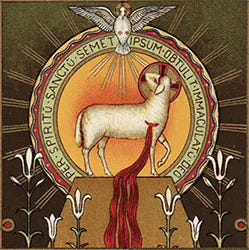The Stripping of the Soul and Clothing Ourselves in Humility
25th Sunday in Ordinary Time, 2024
My Dear Brothers and Sisters in Christ,
I recently heard an interesting story about the American novelist and short story author, Tobias Wolff. Wolff was raised Catholic, but wasn’t much interested in his faith. However, he did spend a summer as a teenager volunteering at the Shrine of Our Lady of Lourdes in France where it was his job to help pilgrims down to the pool of water where many miracles of healing have occurred since our Lady appeared there in in 1858.[1]
On a particularly hot day, Wolff was assisting an extremely ill 8 year old girl, who waiting to get down to the pool at the foot of sanctuary. He saw how desperately ill and uncomfortable she was in the blistering heat. He was doing his best to keep the flies off her, fanning her while he waited. At some point, he grew so frustrated at this little girl’s situation and his inability to help her, that he burst out in tears of profound sadness.
And in that moment, he realized something painful and profound about himself: he didn’t want to witness a miracle because he knew if he did, he would have to change a lot about his life. There would be many sacrifices he would have to make if God showed Himself that day.
This, I think, is an revelatory insight-even when the grace and power of God manifests itself; even when truth and wisdom are drawing near to us, we can and we do resist it because of what it might demand of us.
This, I believe, is at the heart of what the Book of Wisdom is trying to teach us when it says: “Let us beset the just one, because he is obnoxious to us; he sets himself against OUR DOINGS, reproaches us… Let us see whether his words be true…”. We tend to think that if God showed Himself “clearly”, as we would define that, we would obviously desire His holiness, His way, and His will. Such is not an accurate portrayal of the human condition.
We humans can be a very proud, stubborn, and stupid lot. We often insist that “our doings” are the only way. Therefore, we are quite capable of resisting God no matter the way He manifests His holiness and directs us to His way. The bottom line is that we want we want, and we don’t always want to follow. We don’t always want to be converted to Christ.
In my own life, I often see this pride and resistance when there is some suffering, hardship, and imperfection that I don’t want to accept and offer up to Christ; some cross I don’t want to carry or think I shouldn’t have to carry.
It is important to note that the deadly sin of pride doesn’t always show itself in displays of boisterous ego and braggadocio. Rather, more lethally for the soul, it shows itself in a thousand forms of what we tell ourselves are totally reasonable resistances to bearing the crosses, hardships, and tasks entrusted to us by God’s providence for the sake of our salvation.
This resistance often takes the form of the endless rumination over the question, why me?
I recall asking my sister when she was approaching the end of her life after long-suffering with cancer, “do you ever ask, ‘why me?’” She said, “no Phillip, I don’t. When I’m tempted to ask that, I say, why NOT me? This is for me to carry.” I try and remember that when I-to date-have only ever had to bear hardships far less than those she bore.
Pride can take many forms, and it can cloud our vision of God in more ways than we can grasp. The hard truth of the matter is that Jesus Christ is always showing His face, always offering His grace and truth, and always extending His love, but our pride blinds us or causes us to recoil from the ways He offers Himself, because it does not suit our preferences. The fact that He may be offering Himself to us through suffering seems impossible to us. The world has always balked at the folly of the cross as St. Paul noted. I always balk at the folly of the cross. That is why humility is the key Christian virtue which unlocks the whole mystery, truth, and grace of the Gospel and allows us to be filled with the utter fullness of God.
It is in this light that we can begin to understand the humility of the Blessed Virgin Mary. We don’t acknowledge the Blessed Mother’s humility, encapsulated in that beautiful line of the prayer of the Angelus-drawn from the Gospel-“let it be done unto me according to thy word”, because it is some retrograde sign of subservience. Rather, we honor her humility-and seek to imitate and live it-because humility is what allowed her, and will allow us, to be filled with the utter fullness of God in the Holy Spirit. As we pray concerning her, “blessed is the fruit of thy womb, Jesus”, so we acknowledge, blessed is the soul filled with the grace of Jesus Christ. The priority of humility in achieving faith, hope, and love, is made clear for us as we contemplate the Blessed Virgin Mary in perfect communion with her son.
Now, of course, it is very easy to misunderstand the virtue of humility in a world suffused with pride as a norm. Humility is not about being a door mat or being mousy or something like that. Humility is about acknowledging and living our true relationship with all of reality before, though, and in God. I rather like the explanation of humility given by the Nobel Prize winning novelist, Sigrid Unset, a devout, perhaps even mystical, Catholic who said:
“Humility is the acknowledgment of the relation between Him who creates and that which the Creator has created. Growth in humility means an intensification of this acknowledgment; God works, we are His work — our works are a manipulation of material which has been given us, every scrap of it, with tools which we have received as a gift.”[2]
There are so many forces and temptations at work in us and on us that want us to focus on the manipulation of reality to get things the way we want. Consequently, the focus of our lives can become, step-by-step, totally consumed by securing our comfort and vindicating our ego, “our doings”, as the Book of Wisdom says. Oh, we’d never say it so crassly as that, precisely because our pride would obscure that ugly aspect of our strivings. Yet so many forces tempt us see what has been gifted to us as “mine”, the crosses we carry as an arbitrary imposition, and the sufferings we endure as unfair, unjust, and meaningless. That is the path to bitterness and despair, a blindness to the saving Cross of Christ, even as it is existentially planted in our midst.
We all struggle to understand the relationship between sacrifice and suffering in answering the call to follow Christ.
Yet, the mystery of the Cross of Christ teaches us that sacrifice and suffering are unavoidable realities in the imitation of Christ and the life of a disciple leading to the eternal glory of divine love.
However, that same Cross of Christ also reveals to us that Jesus Christ is closest to us in suffering, not far away. It also reveals to us that such suffering is redemptive, for us and for the world. This powerful reality, of course, is the spiritual force and reality that is the Holy Sacrifice of the Mass we celebrate.
In various ways, understanding all this has been an ever-present struggle from the moment Jesus Christ announced Himself as the way, the truth, and the life. In the Holy Gospel we encounter the uncomprehending apostles-and our own lack of comprehension-when Jesus teaches: “The Son of Man is to be handed over to men and they will kill him, and three days after his death the Son of Man will rise.” We see here the path of the Paschal Mystery of Jesus, and the path of all who would follow Him. It through the Paschal Mystery and according to the Paschal path where sacrifice and suffering are transformed into the characteristics of authentic love of God and of neighbor, and where they are laid down as the conditions for resurrection and eternal glory.
The relationship between humility, sacrifice, suffering, the imitation of Christ, the call to conversion, and authentic love of God and neighbor, along with our resistance to the temptation of pride, is well-described by the theologian, Fr. Hans Urs von Balthasaar:
“The central act in all conversion is this dawning awareness of one’s own reality, which, however, is called into being only in the encounter with Jesus. Here all the disguises and subterfuges in which the ego has cloaked and alienated itself are stripped away, and the soul stands naked before God. But is not by her own effort that the soul has divested herself of her garments. It is given to her as a gift.”
The stripping of the soul is a gift? Now, such a things truly stands in great contradiction to the wisdom of the world, to be sure. However, the “garments” with which we often cloak ourselves are the product of pride and self-will. The goal is to clothe ourselves in humility. Such is the spiritual battle! Yet, as the Psalmist proclaims, so we pray, “behold, God is my helper; the Lord sustains my life. Freely will I offer you sacrifice…” This is the precious truth and eternal love we strive to profess with faith and live with devotion, so that we may come to possess Christ’s “redemption both in mystery and in the manner of our life.”
[1] Rod Dreher in Conversation with Andrew Sullivan. The Dishcast, Sept. 13, 2024.
[2] Sigrid Undset (1882-1949), Stages on the Road, p. 24.




